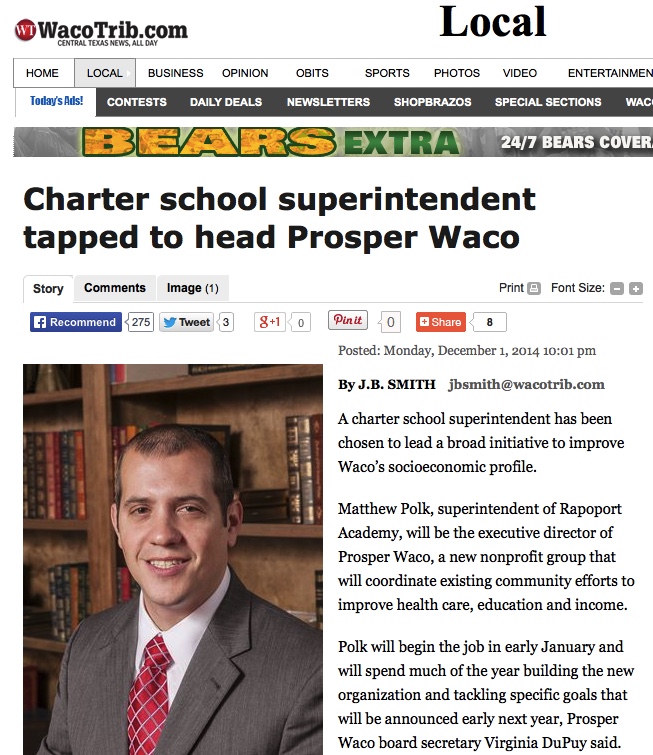What has Rome to do with Waco?
He knows how to write and how to listen and communicate. He has emotional intelligence. He knows how to work with a lot of personalities.
These words describe a friend who was chosen to lead “a new nonprofit group that will coordinate existing community efforts to improve health care, education and income.” Not only do they describe him, they are an explanation of why he was chosen for the job (among other reasons, or course).
As the new executive director of Prosper Waco, Matthew Polk will work with a team of people to “collect and analyze data about the community and then develop metrics to evaluate the progress toward Prosper Waco goals.” His task is incredibly complex. As he says in the article, “it’s not just about education or jobs or any one vector that causes these problems. Education, health care and employment are all intertwined.”
Given the complexity of the task, who did the Prosper Waco board choose to lead them? Someone who “knows how to write and how to listen and communicate.” Someone who “has emotional intelligence.” Someone who “knows how to work with a lot of personalities.”
I have no doubt that Matthew will bring to them a growing store of professional expertise and knowledge about education, health care, and employment. But I think it’s important for parents and educators and, well, anyone who cares about education and society to recognize this: the core competencies that make him most suitable for the job can’t be cultivated and measured by fill-in-the-bubble tests that many schools value so highly. And I don’t think he could have acquired them all through highly specialized training (a good thing!) in each area, even if he were to wind up with three certificates proving that he knows a lot about education, health care, and employment.
Then what sort of education has prepared my friend to take on such a complex and important job? Matthew majored in classics and history as an undergrad. And he continued researching and writing about history at the master’s and doctoral levels. When I met him, he was researching and writing about ancient Rome.
What has Rome to do with Waco?
Though I’m sure Matthew could point out many similarities between Rome and Waco, Texas, I’m afraid I can’t tell you anything about that. But I do know this:
- If a person can listen patiently, sympathetically, and discerningly (or critically) to ancient and modern voices (and in more than one language)…
- If a person can understand something as complex as ancient Roman civilization…
- If a person can make logical connections between cultural, social, political, religious, and other kinds of beliefs and practices…
- If a person can discover and describe connections and patterns that others haven’t seen…
- If a person can communicate this persuasively and winsomely in writing and speech to a diverse group of other people, whether they are sympathetic or hostile to the new ideas…
…then that person has the sort of “real world” skills that are absolutely essential for leading an organization, a company, a family, a community, or a nation in a complex and ever-changing world that tends to pop bubbles, and that puts expiration dates on most certificates.
I don’t mean to reduce my friend’s qualifications to what can be obtained through a liberal arts education. Nor do I mean to suggest that it’s the only way to obtain those qualifications. But when done right (and I freely admit, it’s awfully hard to do it right, whether you’re a student or professor), I think that general and specialized studies in the “liberal arts” is an excellent way to prepare for just about any kind of life imaginable.
At this point, someone might rightly complain that I’m advocating liberal arts education for utilitarian purposes, as if it’s valuable only because, in the end, it has “practical” and “real-world” value. If so, pardon me for emphasizing that aspect in this post. I certainly haven’t said all that can be said about the matter.
I also believe that time spent in “liberal arts” learning — for instance, reading, thinking, and engaging with others about humanity’s biggest, best, and worst ideas; simply admiring and enjoying its treasures; critically discerning its shortcomings — is a wonderful and enriching way to live life even if one can’t find immediate and practical “use” for any of it.
The question I’ll close with is this: Are you in a place where you can become more like my friend Matthew?
If not, find a place — maybe a college, maybe a book club — where you can listen to, and talk with, people who have ideas that are different from your own. You may find it to have “practical” value, or you may not. Either way, I think you’ll grow in a good way; I think it will become one of those life experiences that even the most practical person will treasure for its own sake; and, if you’re a “learning for learning’s sake” kind of person, I think you’ll still find it useful for staying sane and finding your way in a crazy world.
 RSS - Posts
RSS - Posts